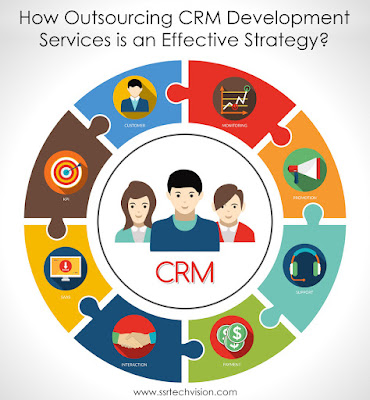Customer
Relationship Management (CRM) mainly
translates
to popular
software
systems and tools that are
used to efficiently
monitor, maintain,
and record customer interactions with a company
and its respective
business
functions.
CRM tools
enable companies
to build and maintain long-term
customer
relationships with their clients. Organizations
across the world, look
towards
custom CRM development India,
as they might not have the desired
time and
other resources
to build one themselves. Most
companies choose to outsource CRM tools
to get access to highly customized software.
Opting
for the right outsourcing
company
enables
them to highly
focus on core business competencies
like
business growth and development.
The
success of any contemporary
organization
depends highly on implementing
successful
marketing & sales strategies. In previous
times, both these business departments
were used interchangeably, however, modern
companies
have strived
to make
clear distinctions to ensure better productivity and business
output. Marketing
refers
to a crucial business
function through which a new
product
or service is presented
in the market and promoted to prospective
customers. The
basic idea of
marketing strategies is
to create impactful
product
awareness
in the market. Without marketing, a company
which
might be offering the best products or services in its
class,
but none of the
prospective customers would know about its features. Marketing helps
to highlight the key Unique Selling Points of a product or service to
target customers. Sales,
on
the other hand, as
a business function is more concerned with improving
sales figures and has
the objective
towards sales conversion to achieve desired targets.
Benefits of CRM Software for Sales
Improved
Lead Conversion & Management - CRM tools
enables a sales team to figure out which sources are generating
top-quality leads in a relative time than other sources. This helps
them to focus on the sources which are churning out maximum reliable
leads. Thus, they can effectively evaluate all the sales and lead
generating sources and avoid those which are generating zero results.
Increased
Upselling and Cross-selling Opportunities- Upselling
refers to the process of selling a product higher in price value than
the one a customer is interested to buy. Cross-selling, moreover,
refers to the popular strategy of selling complementary products
along with the base product. CRM development services
help the sales team to track customer purchase history in a timely
manner and understand their interests and preferences before
suggesting them a product.
Sales
Analysis - CRM
systems
help
a business with crucial sales information
such that the respective
sales
leaders and managers can easily track the daily,
monthly, yearly sales performance of the sales executives working for
the company. Proper
and timely
sales analysis is required
to present sales forecasts for a company and estimate the net
and gross revenue figures.
Benefits of CRM Software for Marketing
Social
Media Integration - Every organization is looking
for ways to improve their social media presence in some way or the
other. All companies have their respective business pages on the
leading social media platforms like Facebook, Instagram, LinkedIn,
etc. This helps them to seek attention of consumers and allow them to
interact with clients and share their valuable feedbacks. CRM tools
enable an organization to effectively integrate all social media
platforms into a single medium to save time.
Data-Driven
Marketing - CRM tools are useful for marketers as they provide
data regarding different marketing channels. Marketing leaders and
managers can easily evaluate the performance of different marketing
campaigns of a business. This enables marketers to focus on
implementing the right marketing budget accordingly. CRM software
systems or tools also empower business pioneers to gain relevant
insight into the performance of the various marketing channels and
the marketing team as a whole.

